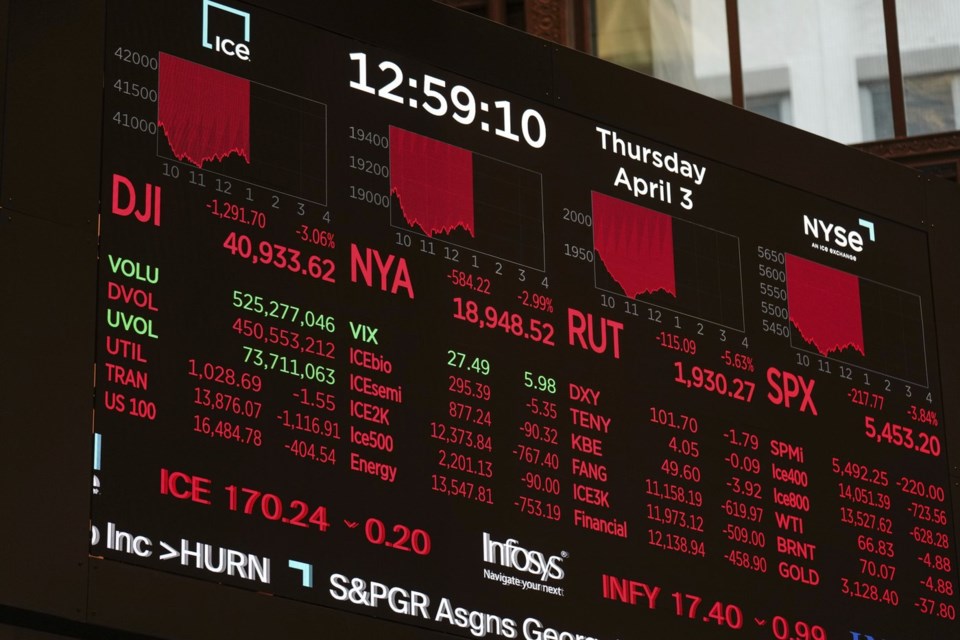TORONTO — Canadian and U.S. stock markets sank for a second straight day Friday, marking even sharper losses than Thursday as U.S. President Trump's tariffs continue to stir recession fears.
“Investors are digesting this escalation and fallout from the U.S. reciprocal tariff announcement, and most recently the aggressive retaliation we've seen from China,” said Kevin Burkett, portfolio manager at Victoria-based Burkett Asset Management.
On Friday China ramped up the pressure by announcing a 34 per cent tariff on all U.S. imports in retaliation to Trump's latest round of duties.
"We're in this global trade war at the same time as we're kind of in this fragile moment in terms of global growth," said Burkett.
The S&P/TSX composite index closed down 1,142.30 points, or 4.7 per cent, at 23,193.47 — more than six per cent off from last week's close. It was led by losses in base metal and energy stocks, as the price of oil also dropped — the May crude oil contract was down US$4.96 at US$61.99 per barrel.
"Traders are reassessing global demand in light of these escalation and trade tensions," said Burkett.
In New York, the Dow Jones industrial average was down 2,231.07 points, or 5.5 per cent, at 38,314.86. The S&P 500 was down 322.44 points, or almost six per cent, at 5,074.08, while the Nasdaq was down 962.82 points, or 5.8 per cent, at 15,587.79.
The S&P 500 is now down more than 17 per cent from its February high and the Nasdaq 20 per cent off its December peak, with trillions of dollars in value wiped out in the latter half of the week alone.
"The market doesn't see trade wars as being good for anybody," said Colin Cieszynski, chief market strategist at SIA Wealth Management Inc.
Trump announced tariffs on a wide swath of countries Wednesday evening, though Canada managed to escape any new duties on its goods.
"There was a lot of back and forth and guessing and speculation — will he, won't he, and how much? And, well, he did, and he did quite forcefully," said Cieszynski.
"What we're looking at going forward is, well, now what?"
The market will likely take a few days to digest the more immediate implications, but the problem with such severe trade actions is there's no quick resolution, Cieszynski said.
"These kind of disputes don't resolve themselves quickly or easily. So this could drag on for a while."
Economists have been warning that the tariffs will be inflationary and will weigh on economic growth, and could cause a recession. In Canada, inflation and economic weakness are also on the table especially after Ottawa has brought in retaliatory tariffs on some U.S. goods.
"You've got this combination of high uncertainty in the short term, because you have daily headlines that don't seem to follow a logical thread, but at the same time you have uncertainty in the long term because the long game hasn't been communicated, and more and more seems perhaps like it hasn't been fully thought through," said Burkett.
"I think there's a very bleak outlook, and I think equity markets are repricing in the face of all those forces."
U.S. Federal Reserve chair Jerome Powell said Friday that a rise in inflation expectations could worsen the problem.
“Our obligation is to keep longer-term inflation expectations well anchored and to make certain that a one-time increase in the price level does not become an ongoing inflation problem,” he said.
Both the U.S. and Canada got fresh data on the labour market Friday, though investors likely had their attention elsewhere, said Burkett.
The U.S. data was better than expected, while the Canadian labour market saw its biggest loss in over three years last month.
The Canadian dollar fell to 70.34 cents US after jumping to over 71 cents US on Thursday.
The May natural gas contract was down 30 cents US at US$3.84 per mmBTU.
The June gold contract was down US$86.30 at US$3,035.40 an ounce and the May copper contract was down 43 cents US at US$4.40 a pound.
— With files from The Associated Press and Ian Bickis
This report by The Canadian Press was first published April 4, 2025.
Companies in this story: (TSX:GSPTSE, TSX:CADUSD)
Rosa Saba, The Canadian Press




